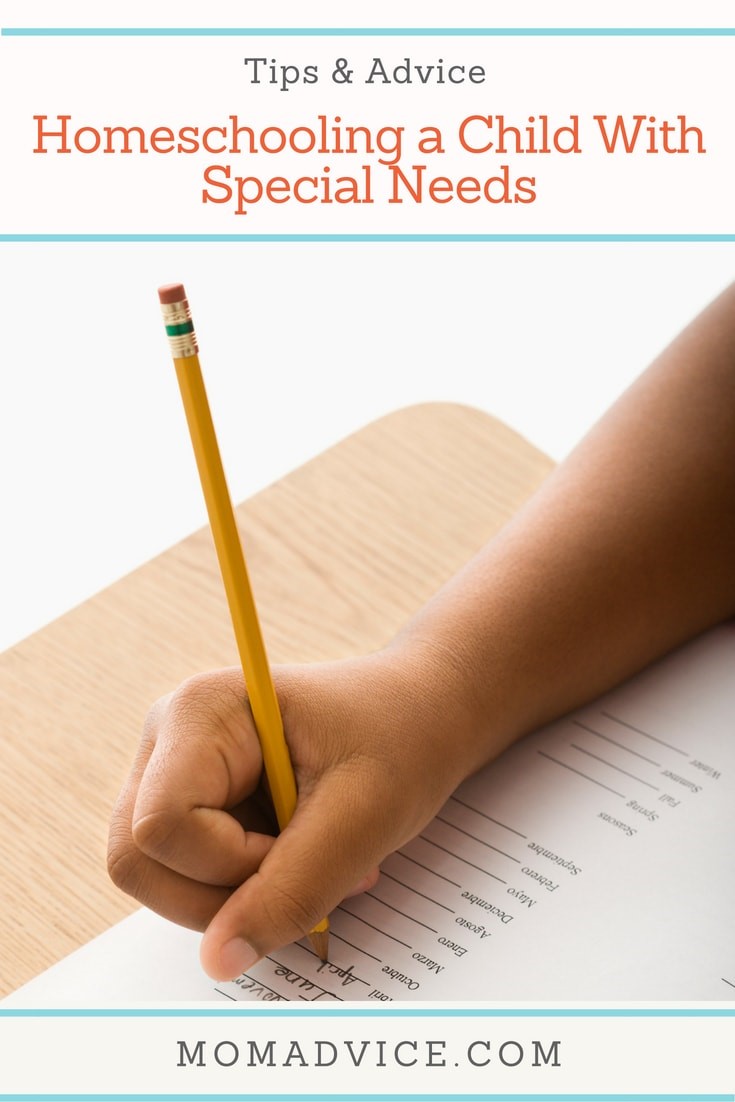
From our guest contributor, Jackie Nunes, of Wondermoms.org
For parents, few things are more heartbreaking than seeing your child unhappy. While you know there will be times when they’ll struggle – especially if they have a disability – you want to minimize those hardships. There are a lot of challenging situations you can’t control, but schooling doesn’t have to be one of them.
If your child isn’t enjoying school or isn’t getting the support and attention they need, homeschooling could be a solution. It’s a weighty decision that requires a lot of planning and a big leap of faith. As you consider homeschooling your child, it’s important to make sure you have all the information you need and understand both the benefits and drawbacks. While every family’s experience is different, here are the pros and cons my family has encountered homeschooling a child with special needs.
 unsplash-logoHugues de BUYER-MIMEURE
unsplash-logoHugues de BUYER-MIMEURE
The Benefits of Homeschooling
There are many advantages to homeschooling, but they all have one thing in common: flexibility. When your child has special needs, the routines, rituals, and educational strategies that work for most kids don’t always fit. Benefits include:
- Ability to focus on your child’s strengths and interests. When teaching your child at home, you can tailor the learning experience to their needs. This means that you’re able to focus on your child’s strengths and interests when deciding how to approach their lessons. If your child is obsessed with dinosaurs or loves the color red, you can work that into your curriculum. You can follow their lead and do things that make them feel proud and accomplished.
- Ability to focus on your child’s weaknesses. If there’s something that’s difficult for your child, you can take the time you need to patiently practice and reinforce it. You might need to try a dozen different approaches before you find one that works, but you set the pace.
- The classroom becomes a relaxing environment. Homeschooling often helps reduce anxiety among children. Because your child is no longer expected to handle the stresses that often accompany traditional schooling, they can focus more on learning and having fun.
- You can better monitor your child’s social encounters. When you homeschool your child, it takes a bit more effort to arrange group activities and get-togethers with other children. But you get to see how your child reacts and is treated in different situations and focus on social experiences that are positive and encouraging. Homeschooling greatly reduces the risk of bullying.
- Homeschooling provides schedule flexibility. You can schedule your day around doctor or therapy appointments, if necessary. You can take as many breaks as your child needs during the day, which helps them feel better and learn better. If you wake up late or your child is having a bad morning, you can move your lessons to the afternoon.
- Learning at home is less overwhelming. Many children with special needs also have sensory processing issues. Although you can’t entirely tune out things like lawnmowers, garbage trucks, and rainstorms, home is almost always a calmer and less chaotic environment than a public school. It has fewer sights, sounds, smells, and crowds that can overwhelm children with special needs. By homeschooling, you have much more control over your child’s learning environment and exposure to external stimuli.
- Field trips are more fun and more relaxing. Your child isn’t pressured to keep up with the rest of his or her class, which means they can take all the time they need to read plaques in museums or look at the animals at the zoo. You can also integrate learning and field trips more due to the much lower number of students.
- Homeschooled children learn constantly. Many families turn to homeschooling to keep their child’s love of learning alive and to kindle that flame that can be at risk of burning out when a child is unhappy in school. Homeschooling enables you to nurture your child’s sense of curiosity and wonder. Learning takes place all the time, not just during the school day. You can follow your child’s lead and let them explore whatever strikes their interest.
 unsplash-logoVladislav Muslakov
unsplash-logoVladislav Muslakov
Some Drawbacks of Homeschooling (and Solutions)
As with anything, there are downsides to pulling a child with special needs out of a traditional school. Here are a few things to consider before making your final decision.
- Less structure. Many kids thrive on routines and no matter how hard you try, you won’t be able to replicate the daily rhythms and predictability of a traditional school. For some kids, it can be confusing to have the line between home and school be blurry. Consider setting aside part of your home and creating a dedicated space for homeschooling to create a clear separation between play time and school time. You can also create a daily schedule, post it in a prominent place, and stick to it as closely as possible.
- Access to facilities for art, music, and sports. While homeschooling, you may miss out on a few things that a traditional schooling experience would offer your child, like a gymnasium, sports fields, music program, auditorium, and art room. Enrolling your child in after-school art or music enrichment classes and signing up for a Little League or Special Olympics sports team can help fill the gap.
- Less social interaction. There is a risk of becoming socially isolated when you homeschool a child with special needs because outings generally take more effort and planning. But it’s important for children to interact with peers of the same age to develop friendships and social skills. It is also helpful for neurotypical kids to be around people with disabilities to develop awareness, compassion, and understanding of special needs. Be sure to network with other homeschoolers and make the effort to expose your child to others kids both with and without special needs.
- Finding specialists and outside professionals. Most school districts employ professionals including speech therapists, guidance counselors, and special education experts. If your child needs therapies, support, or assessments, your child might still be entitled to them even though you homeschool. It could take some extra research and outreach to access these resources, but in many cases specialists will come to your home. Start with your local school district and your health insurance plan. If you run into difficulties and think you’re being denied services unfairly, contact a lawyer who specializes in disability law to find out what your rights are.
- No school nurse. Since your child won’t have access to a nurse throughout the day like they would in a traditional school, it’s always a good idea for homeschooling parents to have a basic knowledge of first aid and CPR.
- Exhaustion and burnout. Homeschooling is a huge undertaking. It can be exhausting to serve as teacher, parent, companion, and therapist 7 days a week, 365 days a year, It’s important to pace yourself and schedule kid-free time to maintain your sanity. Be sure to get a sitter from time to time and have date nights with your spouse or significant other. Maintain adult friendships. You will be more helpful to your child if you take care of your own needs.
Creating an At-Home Learning Space
When children are first getting used to being homeschooled, it’s important to set clear boundaries between time meant for school and time meant for play. In an effort to decrease confusion, many parents set up a classroom space meant only for schooling. When setting up this space, there are some things parents should keep in mind.
- Choose your room carefully. It needs to be big enough to hold a desk for your child as well as one for yourself with space left to walk around. Spill-proof flooring is also a great idea for the classroom.
- Get adventurous with your seating. If you have a child who’s particularly restless, try fun seats like bean bag chairs or yoga balls to keep them seated and focused on their schooling. For many kids, a sensory-rich environment is beneficial.
- Set up lighting. Think about picking a room that has natural lighting, which is proven to be better for learning. In addition to natural light, make sure you have artificial lights as they will be necessary on rainy days or if homeschooling in the evenings.
- Decorate your classroom. When decorating, it’s a good idea paint your walls a calming color. Add pops of color throughout the room to keep the environment fun and exciting. Hang posters, and chalk or dry erase boards on your classroom walls.
- Think about making an outdoor learning area. Working in nature is a great incentive for your children to behave during class and allows them to discover new things about their environment.
- Furnish your classroom. Make sure you keep it clean at all times, as cleanliness is important when it comes to productivity. Consider making a game for you and your child that involves cleaning your classroom at the end of the day.
- Place a couple of bookcases in the room. Make sure anything that your child will need to have access to is on lower shelves.
- Make storage space. To create the best experience for you and your child, be sure to establish routines and keep clutter at bay. Buy containers of many different sizes and shapes. Label them with pictures based on what you store in them.
To Sum It All Up
Though it does come with its fair share of bumps in the road, homeschooling is a path that many parents choose to go down. If you’ve properly prepared yourself, your home, and your child for homeschooling, you can not only help your child learn better, but you can strengthen your relationship with them. Studies have found that homeschooling can be a great benefit to both children with special needs and the parents who love them.
Jackie Nunes is a former pediatric nurse who is now a full-time homeschool educator and co-founder of Wondermoms.org. She and her husband have three children, all of whom are taught at home. Their middle child, an 11-year-old daughter, is hearing impaired, developmentally disabled, and uses a wheelchair.
Looking for more parenting advice? These articles might help too!
Pin It